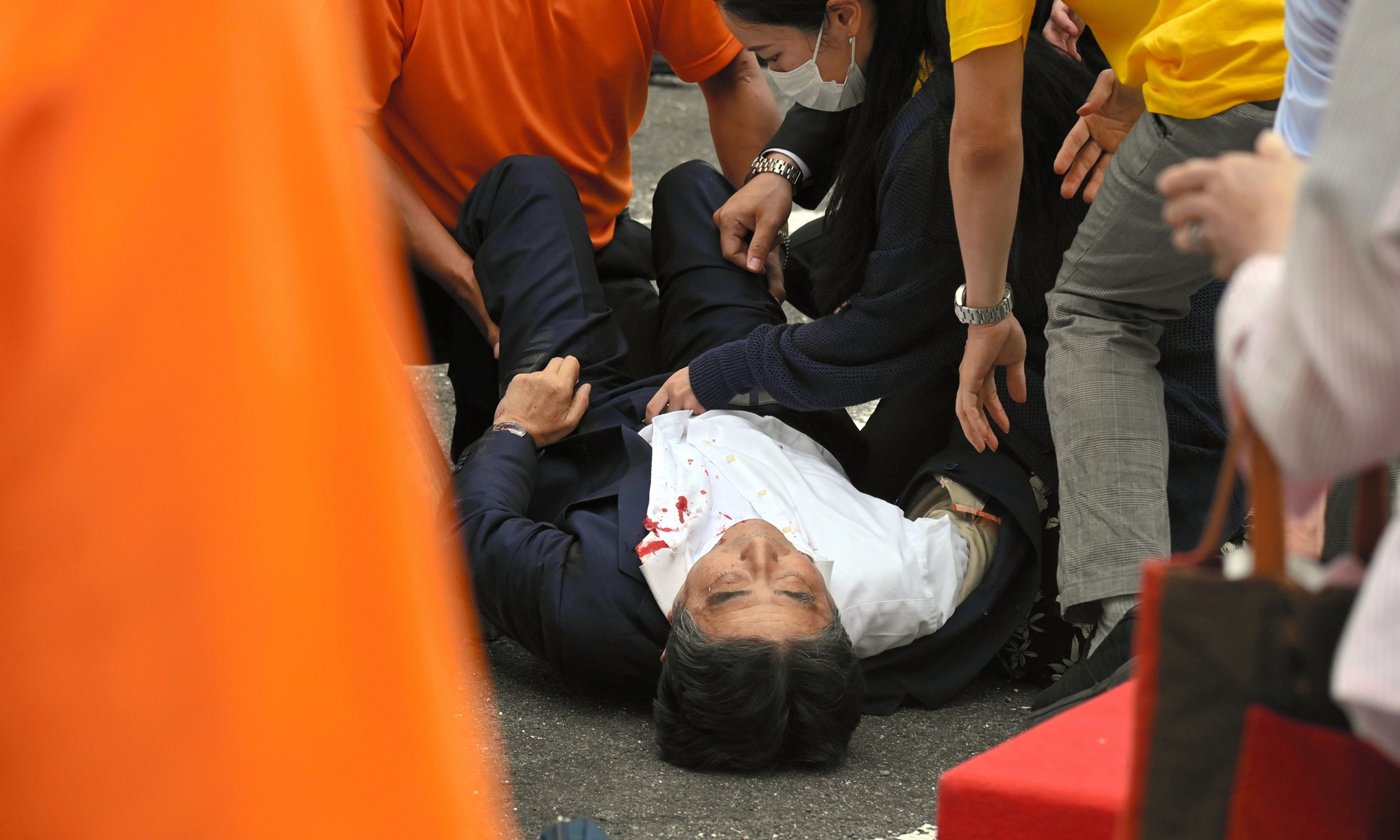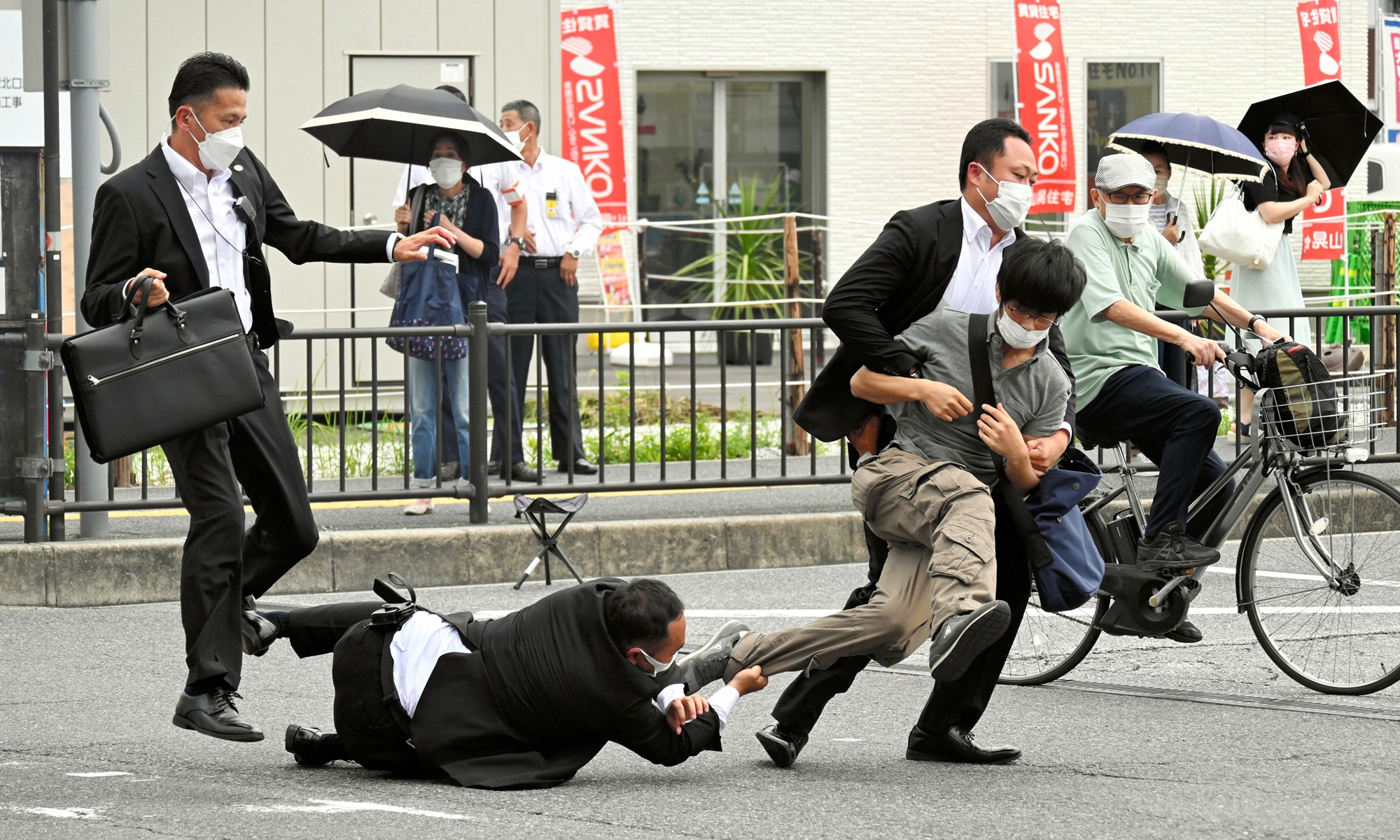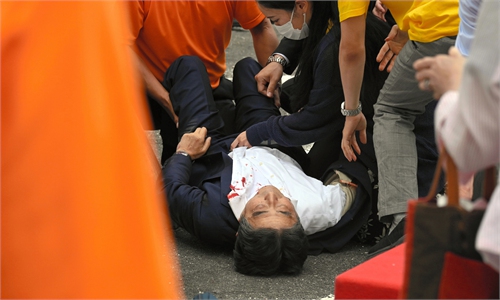Japan's ex-leader Shinzo Abe dies from gunshot, 'biggest political incident in post-WWII Japan'

Photo: VCG
Former Japanese prime minister Shinzo Abe, 67, died hours after being shot by a gunman on July 8 in western Japan's Nara, where he was making a campaign speech for the parliament's upper house election to be held on Sunday. Analysts described Abe's assassination as the biggest political incident in Japanese politics since the end of World War Two.
A doctor with the Nara Medical University Hospital said at a press conference that Abe died at 5:03 p.m, Kyodo News reported, hours after Abe was shot from the back and collapsed during his street speech, with blood on his shirt.
The attacker has been arrested and the case is under investigation by the local police. According to Japanese media reports, the suspect is a 41-year-old man and the motive for the attack remains unclear.
After the announcement of Abe's death, Chinese Embassy in Japan also mourned Abe's passing and extended condolences to his family.
Before his death was announced, Chinese Foreign Ministry spokesperson Zhao Lijian commented at a press briefing on Friday that Abe used to make contributions to improving Japan's ties with China.
As a two-time prime minister and leader of the largest faction in Japan's ruling Liberal Democratic Party (LDP), the attack on Abe could ripple through Japanese politics and the international community, experts said. The Japanese right-wing forces may use this incident to push forward the trend of conservative transformation in Japanese politics, and Abe's supporters will continue to promote "free and open Indo-Pacific" and his other policies, bringing more security risks to the geopolitics of Northeast Asia, according to analysts.

Security personnel tackle a suspect believed to have shot former prime minister Shinzo Abe on July 8, 2022 in Nara, Japan. Photo: VCG
Not just by accident
Xiang Haoyu, a research fellow at the China Institute of International Studies, told the Global Times on Friday that given that the shooting comes at a sensitive time ahead of the upper house election, political motives could not be ruled out.
Although Abe has been the longest-serving prime minister in Japan, there are mixed opinions on Abe in Japan, and anti-Abe public opinions have always existed, including dissatisfaction with the widening gap between the rich and the poor caused by Abenomics, and disgust with his forced adjustment of military and security policies, Xiang said.
Liu Jiangyong, vice dean of the Institute of Modern International Relations at Tsinghua University, told the Global Times on Friday that Japan is facing multiple problems such as the depreciation of the yen, inflation, unemployment and the rebound of the epidemic, which all require the Japanese government to take effective measures.
As the leader of Japan's largest political faction, Abe has long wielded a lot of influence in the country's domestic and foreign affairs, Liu said, noting that Japan's opposition is too loose to balance the LDP's policies.
Therefore, it cannot be ruled out that the criminal suspect was strongly dissatisfied with the policies of the Japanese government under the "de facto control of Abe," as there's no way to change the status quo, so he picked an extreme way, Liu said.
Stimulation to the right wing
Although the attacker's political leanings have yet to be officially confirmed, Chinese experts said it is almost certain that Abe's death will not stop the conservative trend in Japanese politics as a whole, but may strengthen it to some extent.
Abe has served as Japanese prime minister twice, from 2006 to 2007 and from late 2012 to 2020, making him the longest-serving prime minister under Japan's modern cabinet system. Abe has continued to play a major role in Japanese politics as a member of the House of Representatives since stepping down as prime minister in September 2020 due to health problems.
"Abe's visit to Nara is to promote the LDP's constitutional revision program," said Lü Yaodong, a research fellow with the Institute of Japanese Studies under the Chinese Academy of Social Sciences. He added that Abe's future successor could accelerate the constitutional revision process under the banner of "inheriting Abe's legacy."
The attack on Abe will certainly provoke the extreme Japanese right wing, Lü said.
Da Zhigang, director of the Institute of Northeast Asian Studies at Heilongjiang Provincial Academy of Social Sciences, told the Global Times on Friday that ahead of upper-house elections, Abe's death could serve as a "symbol" for the LDP conservative forces to gain more sympathy from the Japanese public.
At the moment, Japan does not seem to have the potential to radically change the country's trajectory or the regional dynamics, but Abe's death could stimulate the extreme Japanese right wing to promote populist, xenophobic and even extreme political goals, Lu Hao, a research fellow at the Institute of Japanese Studies at the Chinese Academy of Social Sciences, told the Global Times on Friday.
Similar to Japan's domestic politics, Abe's successors and supporters are expected to continue to promote Abe's external policy in Indo-Pacific and active participation in the QUAD mechanism, and accelerate the pace of NATO's entry in Asia, bringing more risks to the geopolitics of Northeast Asia, Lü said.

